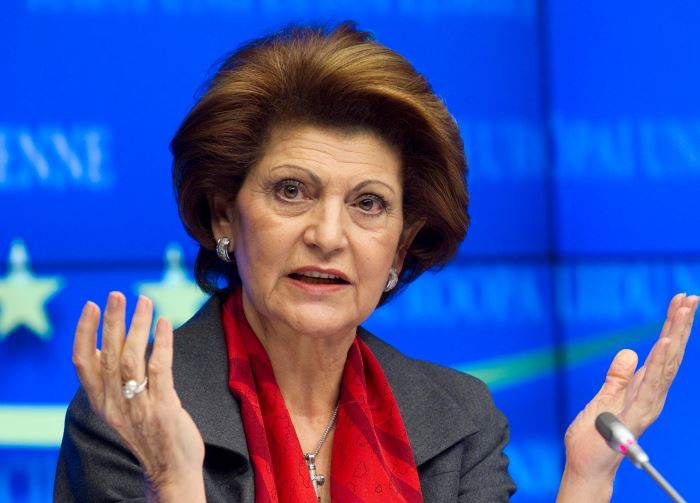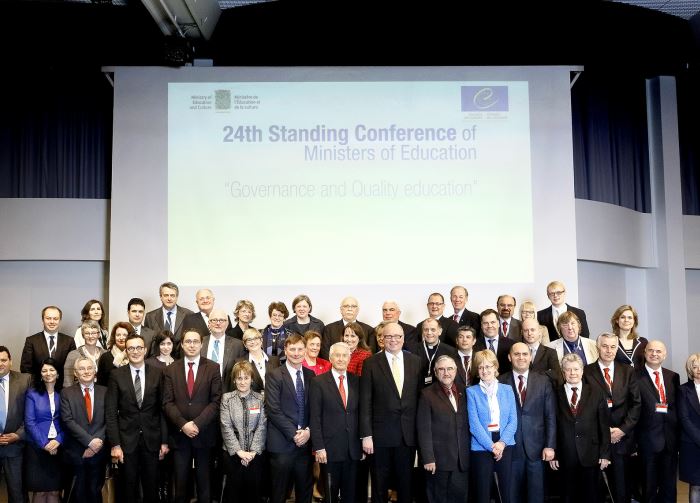“Governance and Quality education”
Helsinki, Finland, 26-27 April 2013
The ministerial Conference, held in Helsinki and hosted by the Finnish Ministry of Education, was dedicated to governance and quality education and highlighted contemporary challenges in the implementation of governance and quality standards based on the vision of the Council of Europe.
This 24th Session provided ministers and high-level delegations from 43 European States, as well as Mexico and the European Union with the opportunity to focus on the roles and responsibilities of public authorities, gain knowledge and share effective results of policies, local contribution and international co-operation in ensuring good governance and quality education for all.
Education Ministers back pan-European anti-corruption platform and ethical code for teachers
European Ministers backed the creation of a Europe-wide platform to tackle corruption and fraud in education and an ethical code for teachers.
The platform and ethical code are part of a five-point plan agreed by Ministers to ensure access to an education of quality for every pupil and student in Europe and beyond, including Roma and other vulnerable and disadvantaged children.
The platform would provide training, codes of conduct, accreditation and quality assurance and a space to share best practice.
It is not always widely understood that corruption is a real or potential problem at all levels of education across Europe, although the extent of corruption varies from country to country. It is most widespread regarding access to higher education and higher education qualifications.
Corruption in education ranges from payment or favours in exchange for higher grades or for passing examinations, to more subtle forms of corruption where teachers only pass students who pay for additional ‘services’ such as extra lessons or books.
The other key points agreed by the conference are:
• Policy development to ensure access to education for all pupils, with special measures for those who have dropped out of school.
• Action to bring democratic and intercultural competences into the school curriculum and universities, and,
• Moves to measure the levels of participation in education as part of a project to assess citizens’ participation in the life of their communities.
Government representatives have already agreed that quality education requires universal access to learning as well as qualified teachers and the absence of violence and corruption in schools.
Measures decided
Some of the measures to be taken are:
• to provide the necessary means for students to be able to participate and thereby creating a meaningful, inclusive and real participation at higher education level;
• to reinforce the autonomy of the institutions, through the creation of adequate structures which enable schools and higher education institutions to improve students’ achievements by setting objectives, achieving results, solving problems and adapting procedures within the framework of public responsibility for education;
• to support, through appropriate public policies, the education of professionals (including teachers, school principals and administrators) at all levels and throughout their career, thereby ensuring that they are fully capable of meeting their educational and societal responsibilities.
The above measures should principally lead to:
• develop an inclusive, successful and sustainable education system, respectful of all its participants and its different levels;
• provide all pupils and students with the necessary knowledge, competences and skills so that they are able to live their lives as active citizens in democratic and increasingly diverse societies and to integrate into the complex and continuously changing world of work;
• ensure that public responsibility for higher education, including provision for quality assurance, extends to private providers thereby guaranteeing that students can fully participate in higher education.
• to establish a pan-European platform of exchange of information and best practices on ethics and integrity in education with special attention to the fight against corruption and fraud in education and research with a view to furthering the “Helsinki agenda for quality education in Europe”.
More specifically, such a platform would focus on:
a. positive codes of conduct as a complement to anti-corruption and anti-fraud legislation for professionals who are active in education and research;
b. Capacity-building for all actors;
c. Supporting structures (agencies for accreditation or quality assurance);
d. Sharing of best practices concerning fairness and transparency;
e. Developing a culture of democracy and participation based on transparency, fairness and equity.
 Androula Vassiliou, European Commissioner for Education, Culture, Multilingualism and Youth, and Key-note Speaker at the Conference, emphasised the Commission’s efforts to step up the impact of education policies in today’s challenging conditions. The Commissioner made special reference to the Rethinking Education strategy and the ‘Opening Up Education’ initiative, as part of a wider debate on good governance and quality education. The Rethinking Education strategy provides guidance on how to ensure that investment in education and training is smart, targeted and effective.
Androula Vassiliou, European Commissioner for Education, Culture, Multilingualism and Youth, and Key-note Speaker at the Conference, emphasised the Commission’s efforts to step up the impact of education policies in today’s challenging conditions. The Commissioner made special reference to the Rethinking Education strategy and the ‘Opening Up Education’ initiative, as part of a wider debate on good governance and quality education. The Rethinking Education strategy provides guidance on how to ensure that investment in education and training is smart, targeted and effective.
“There are currently over two million job vacancies in Europe that cannot be filled due to a lack of relevant skills, particularly in IT” Vassiliou said. The ‘Opening Up Education’ initiative, due to be unveiled this summer, aims to ensure that Europe seizes the potential of the digital revolution to boost efficiency, quality, excellence and accessibility in education and training, by taking full advantage of the opportunities provided by ICT and open educational resources.
Commissioner Vassiliou also hold bilateral meetings with EU Ministers to update them on progress in the negotiations on the Erasmus for All, the new programme for education, training, youth and sport, which is due to be launched on 1 January 2014. According to the plans 4 million people would receive grants to study, train or volunteer abroad by the end of the decade, compared with 2.5 million people under comparable programmes in 2007-2013. The skills gained through this international experience, including foreign language fluency, intercultural awareness and versatility, can improve people’s employability.



